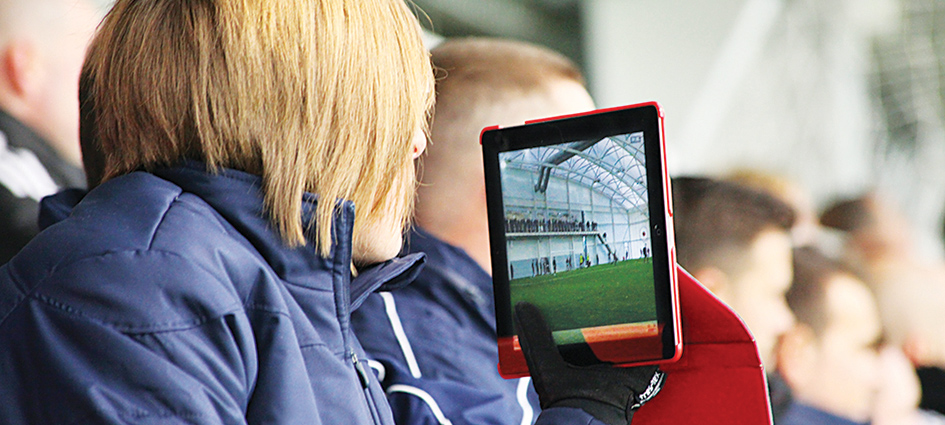
How using technology can improve reflection
- Ronnie Reason
- 14 March 2019
Watching footage of your coaching session is a hugely valuable tool in the process of reflection. Here, Ronnie Reason, FA county coach developer, provides a practical guide to filming your coaching sessions without the use of specialist equipment.
Coaching is an on-going cycle of plan, do, review in which a coach is expected to help support the development of the players as well continually improve as an individual.
Reflective practice can support a coach to develop critical thinking skills and improve future performance. However, how accurate is a coach’s memory?
FA coach mentor, Ceri Bowley, highlighted that research suggests that experienced football coaches have been shown to be able to recall just 59.2% of the critical events occurring during 45 minutes of football performance (Laird and Waters, 2008).
A lack of recall accuracy not only reduces the accuracy of feedback to players but also may impact the accuracy of a coach’s belief of their coaching performance.
Sherin and Van Es (2005) found that, through the use of video, students involved in their research were able to make more evidence based comments about their teaching.
Implementation of technology has been established with coaches undertaking UEFA A and UEFA B coaching courses. Candidates now have regular opportunities to see footage of their coaching sessions in order to support more effective reflection and peer feedback.
Coaches are encouraged to examine their own sessions and engage with the tutor in a more collaborative review to clarify learning points.

With the proportion of adults who personally own/use a mobile phone in the UK at 93%, it is possible for video analysis to be used at grassroots level as well.
With this in mind, The FA county coach developer team in the North West experimented filming a variety of coaching sessions and courses with the combination of two mobile devices: one mobile device and an iPad and one mobile device and a digital camera.
The footage has been used to reflect on our own delivery, learner/peer reflection as well as for self-reflection. Coaches on courses have responded well to the use of filming using their mobile phones, providing a collaborative approach to post session debriefs.
To do this for your own coaching sessions, you will need:
Hardware
- one recording device for audio (mobile phone with free voice memo app)
- one recording device for video (either mobile phone, iPad, camera)
- mobile phone headphones with speaker and a clip
- tri-pod (helps steady the footage; however willing volunteer/parent will suffice).
Software
- movie editor (most systems have a free application)
- free voice memo app for phone
- free compressor app.

Once you’re set up, follow this process:
Plan
1. Decide on a focus for reflection and the duration of the video. Areas of focus may concentrate on: communication skills, interventions, the learning cycle, game related understanding, organisation, motivation of players or session management. Keep the video specific and concise - once you have identified a focus, identify what period of the session you want to film (15-20 minutes is a good time to maintain your focus when watching back). This can link to types of practices learnt on FA Courses, a welcome activity or whole or part practices.
2. Identify a volunteer who may assist you. Gain consent from parents to film for training purposes.
Do
3. Coach wears headphones connected to audio recording device. Clap hands in view of camera to assist synchronising audio and video later.
4. Volunteer/parent records session with video recording device (adopt a position to observe the coach and players in immediate location to the coach). Please note - the volunteer records the video using the coach’s phone with the audio recorded on the volunteer’s phone. Transfer the recording by airdrop or dropbox after session.
5. Compress video using compressor app and save audio files. Save audio to drop box or airdrop (if using apple products) and to the phone used to record the video.
6. Using a phone or laptop, import audio and video into movie maker cut and align audio and video.
Review
It may be an uncomfortable feeling watching yourself coach, however the benefits vastly outweigh the temporary uncomfortable feeling. The first task is to focus. Avoid being too critical of yourself; it is important to focus on the specific area(s) that you identified in the planning stage. If you try to focus on everything you may become overly critical.
When watching the film, identify three aspects in which you did well against the area you highlighted and then identify one or two aspects you could improve upon within the area.
Then make the process count. Plan to work on the improvement areas, as well as planning to continue to develop your areas of strength. Highlight goals/targets to help you develop along your coaching journey - remember it’s not a race, give yourself time to experiment and reflect. After a period of time, film yourself again and review the progress you have made.
Ronnie Reason is an FA county coach developer supporting grassroots coaches in Staffordshire. This article was first published in The Boot Room magazine in April 2016.


